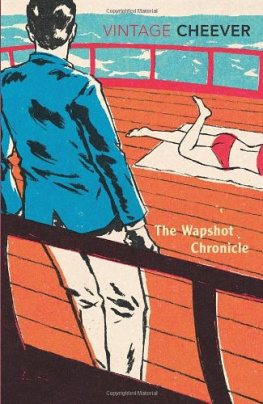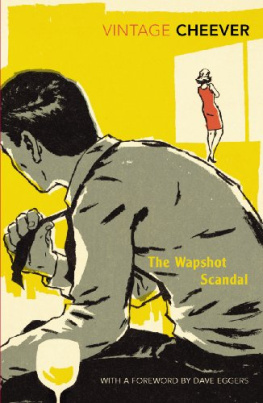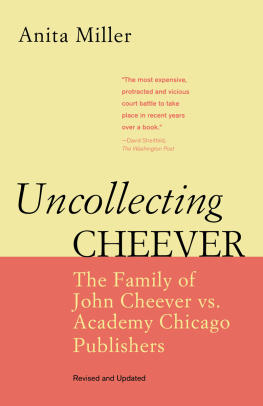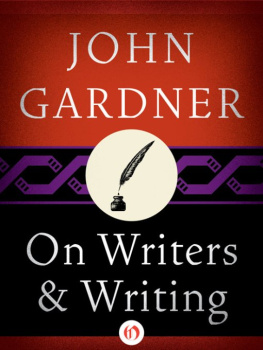John Cheever
THE STORIES OF JOHN CHEEVER
CONTENTS
Preface
Goodbye, My Brother
The Common Day
The Enormous Radio
O City of Broken Dreams
The Hartleys
The Sutton Place Story
The Summer Farmer
Torch Song
The Pot of Gold
Clancy in the Tower of Babel
Christmas Is a Sad Season for the Poor
The Season of Divorce
The Chaste Clarissa
The Cure
The Superintendent
The Children
The Sorrows of Gin
O Youth and Beauty!
The Day the Pig Fell into the Well
The Five-Forty-Eight
Just One More Time
The Housebreaker of Shady Hill
The Bus to St. James's
The Worm in the Apple
The Trouble of Marcie Flint
The Bella Lingua
The Wrysons
The Country Husband
The Duchess
The Scarlet Moving Van
Just Tell Me Who It Was
Brimmer
The Golden Age
The Lowboy
The Music Teacher
A Woman Without a Country
The Death of Justina
Clementina
Boy in Rome
A Miscellany of Characters That Will Not Appear
The Chimera
The Seaside Houses
The Angel of the Bridge
The Brigadier and the Golf Widow
A Vision of the World
Reunion
An Educated American Woman
Metamorphoses
Mene, Mene, Tekel, Upharsin
Montraldo
The Ocean
Marito in Citt
The Geometry of Love
The Swimmer
The World of Apples
Another Story
Percy
The Fourth Alarm
Artemis, the Honest Well Digger
Three Stories
The Jewels of the Cabots
PREFACE
IT WOULD please me if the order in which these stories are published had been reversed and if I appeared first as an elderly man and not as a young one who was truly shocked to discover that genuinely decorous men and women admitted into their affairs erotic bitterness and even greed. The parturition of a writer, I think, unlike that of a painter, does not display any interesting alliances to his masters. In the growth of a writer one finds nothing like the early Jackson Pollock copies of the Sistine Chapel paintings with their interesting cross-references to Thomas Hart Benton. A writer can be seen clumsily learning to walk, to tie his necktie, to make love, and to eat his peas off a fork. He appears much alone and determined to instruct himself. Nave, provincial in my case, sometimes drunk, sometimes obtuse, almost always clumsy, even a selected display of one's early work will be a naked history of one's struggle to receive an education in economics and love.
These stories date from my Honorable Discharge from the Army at the end of World War II. Their order is, to the best of my memory, chronological and the most embarrassingly immature pieces have been dropped. These stories seem at times to be stories of a long-lost world when the city of New York was still filled with a river light, when you heard the Benny Goodman quartets from a radio in the corner stationery store, and when almost everybody wore a hat. Here is the last of that generation of chain smokers who woke the world in the morning with their coughing, who used to get stoned at cocktail parties and perform obsolete dance steps like "the Cleveland Chicken," sail for Europe on ships, who were truly nostalgic for love and happiness, and whose gods were as ancient as yours and mine, whoever you are. The constants that I look for in this sometimes dated paraphernalia are a love of light and a determination to trace some moral chain of being. Calvin played no part at all in my religious education, but his presence seemed to abide in the barns of my childhood and to have left me with some undue bitterness.
Many of these stories first appeared in The New Yorker, where Harold Ross, Gus Lobrano, and William Maxwell gave me the inestimable gifts of a large, discerning, and responsive group of readers and enough money to feed the family and buy a new suit every other year. "This is a family magazine, God damn it," Ross used to yell at any hint at the stirring of erotic drives. He was not himself a decorous man, and when he discovered that I would jump whenever he used the word "fuck" across the lunch table he would frequently say "fuck" and watch me jump. His lack of decorum was, in fact, pronounced and if, for example, he anticipated a dull poker companion, he would go into the bathroom and return with his ears stuffed with toilet paper. This sort of behavior would never, of course, appear in the magazine. But he taught one, I like to think, that decorum is a mode of speech, as profound and connotative as any other, differing not in content but in syntax and imagery. Since the men he encouraged ranged as widely as Irwin Shaw and Vladimir Nabokov, he seems to have done more good than anything else.
Any precise documentation of one's immaturity is embarrassing, and this I find from time to time in the stories, but this embarrassment is redeemed for me by the memories the stories hold for me of the women and men I have loved and the rooms and corridors and beaches where the stories were written. My favorite stories are those that were written in less than a week and that were often composed aloud. I remember exclaiming: "My name is Johnny Hake!" This was in the hallway of a house in Nantucket that we had been able to rent cheaply because of the delayed probating of a will. Coming out of the maid's room in another rented house I shouted to my wife: "This is a night when kings in golden mail ride their elephants over the mountains!" The forbearance of my family has been inestimable. It was under the canopy of a Fifty-ninth Street apartment house that I wrote, aloud, the closing of "Goodbye, My Brother."
"Oh, what can you do with a man like that?" I asked, and closed by saying, "I watched the naked women walk out of the sea!"
"You're talking to yourself, Mr. Cheever," the doorman said politely, and he toocorrect, friendly, and content with his ten-dollar tip at Christmasseems a figure from the enduring past.
Goodbye, My Brother
We are a family that has always been very close in spirit. Our father was drowned in a sailing accident when we were young, and our mother has always stressed the fact that our familial relationships have a kind of permanence that we will never meet with again. I don't think about the family much, but when I remember its members and the coast where they lived and the sea salt that I think is in our blood, I am happy to recall that I am a Pommeroythat I have the nose, the coloring, and the promise of longevityand that while we are not a distinguished family, we enjoy the illusion, when we are together, that the Pommeroys are unique. I don't say any of this because I'm interested in family history or because this sense of uniqueness is deep or important to me but in order to advance the point that we are loyal to one another in spite of our differences, and that any rupture in this loyalty is a source of confusion and pain.
We are four children; there is my sister Diana and the three men Chaddy, Lawrence, and myself. Like most families in which the children are out of their twenties, we have been separated by business, marriage, and war. Helen and I live on Long Island now, with our four children. I teach in a secondary school, and I am past the age where I expect to be made headmasteror principal, as we saybut I respect the work. Chaddy, who has done better than the rest of us, lives in Manhattan, with Odette and their children. Mother lives in Philadelphia, and Diana, since her divorce, has been living in France, but she comes back to the States in the summer to spend a month at Laud's Head. Laud's Head is a summer place on the shore of one of the Massachusetts islands. We used to have a cottage there, and in the twenties our father built the big house. It stands on a cliff above the sea and, excepting St. Tropez and some of the Apennine villages, it is my favorite place in the world. We each have an equity in the place and we contribute some money to help keep it going.
Next page









